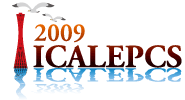ICALEPCS 2009
WED003
SLIDE
Progress of the Virtual Laboratory for Fusion Researches in Japan
K.Hiraki (IST) H.Nakanishi, S.Ishiguro, S.Okamura, S.Takami, T.Yamamoto*, Y.Nagayama (NIFS)
SNET is a virtual laboratory system for nuclear fusion research in Japan, it has been developed since 2001 with SINET3, which is a national academic network backbone operated by National Institute of Informatics. Twenty one sites including major Japanese universities, Japan Atomic Energy Agency and National Institute for Fusion Science (NIFS) are mutually connected on SNET with the speed of 1 Gbps in 2008 fiscal year. The SNET is a closed network system based on L2/L3VPN. Collaboration categories in SNET are as follows: the LHD remote participation; the remote use of supercomputer system; the all Japan Spherical Tokamak (ST) research program. For example, the collaborators of the first category in a remote station can control their diagnostic devices at LHD and analyze the LHD data as if they were at the LHD control room. ITER activity has started in 2007 and 'The ITER Remote Experimentation Centre' will be constructed at the Rokkasho village in Japan under ITER-BA agreement. SNET would be useful for distributing the data of ITER to Japanese universities and institutions.

